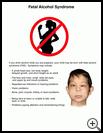
Fetal Alcohol Syndrome in Children
________________________________________________________________________
KEY POINTS
- Fetal alcohol syndrome (FAS) is the term used for problems a child may have if the child’s mother drinks alcohol during pregnancy.
- Some problems caused by FAS can be treated. For example, heart problems and face deformities can often be helped by surgery. Special education classes in school can help if your child has learning or behavior problems. Seeing a mental health therapist can help you and your child deal with depression, learning disabilities, aggression, or anger.
- FAS can only be prevented by not drinking alcohol during pregnancy or when trying to get pregnant.
________________________________________________________________________
What is fetal alcohol syndrome?
Fetal alcohol syndrome (FAS) is the term used for problems a child may have if the child’s mother drinks alcohol during pregnancy. The problems may be physical, mental, or behavioral.
The effects of FAS last throughout life. A baby with FAS may be irritable, nervous, and sensitive to sound and light and may cry often. The problems change as the child grows up. Problems with aggressive behavior, mental illness, and substance use disorders may start in the teen years.
What is the cause?
FAS can happen if the child’s mother drinks beer, wine, or hard liquor while pregnant. Any alcohol a pregnant woman drinks goes into her bloodstream and then through the placenta and into the baby's bloodstream. The amount of alcohol in the baby's bloodstream is the same as the amount in the mother’s bloodstream. Alcohol can affect the baby's growth and development.
The problems caused by drinking alcohol are different throughout your pregnancy. If you drink alcohol:
- In the first 3 months, your baby may be born with a small brain, physical problems, and severe learning problems.
- In the next 3 months, there is a greater risk that you will have a miscarriage.
- In the last 3 months, your baby may be born with learning, growth, and behavior problems.
It is not clear how much alcohol puts the baby at risk. However, the more a woman drinks during her pregnancy, the more likely it is that the alcohol will harm the baby. Because we do not know what level of alcohol is safe, drinking no alcohol at all during the entire pregnancy is the only sure way to avoid any risk of problems from alcohol.
Not all babies whose mothers drink alcohol during pregnancy are born with FAS. It is not understood why some babies are born with problems and others are not.
What are the symptoms?
After birth, children who have FAS may have one or more of the following problems:
- A small head size, low body weight, delayed growth, and short height as an adult
- Flat shape of face and nose, small, wide set eyes, thin upper lip, and mouth problems such as a cleft palate
- Seizures
- Bone, joint, muscle, kidney, or heart problems
- Repeated ear infections or hearing problems
- Vision problems
- Clumsiness and poor balance
- Poor sleep
- Being slow to learn or unable to talk, walk, read, or write
- Problems paying attention and remembering things
- Being unable to keep still
- Poor social skills and problems getting along with others
More than a third of children with FAS develop drug and alcohol problems by the time they are young adults. Many have anger control problems and may be violent. They are at high risk for getting into trouble with the law.
How is it diagnosed?
A healthcare provider can diagnose FAS by:
- Reviewing your pregnancy and birth history
- Giving your child a physical exam
- Testing your child’s abilities to respond, communicate, move, and learn
- Measuring facial features
How is it treated?
It is important to get help early. Young children who get help early may need less help when they are older.
Some problems caused by FAS can be treated. For example, heart problems can often be helped by surgery. Plastic surgery can help correct severe face deformities.
Special education classes can help if your child has learning or behavior problems. There are many types of services that schools offer:
- Evaluation and assessment of your child's abilities and needs
- Special classes and specially trained teachers and aides
- Classroom accommodations such as books in large print for a visually impaired child or a special desk for a child with a physical disability
- Assistive technologies such as special computers or keyboards, digital recorders, or hearing devices
- Speech and language therapy
- Occupational therapy for problems with movement and senses such as touch, body awareness, sight, sound
- Physical therapy for children with bone, muscle, and joint problems
All public schools in the US offer special classes for students with learning problems who are between the ages of 3 and 19.
Seeing a mental health therapist can help you and your child deal with depression, learning disabilities, aggression, anger, or hyperactivity.
Medicine may be prescribed to help with some behaviors and symptoms.
How can I help my child?
FAS can only be prevented by not drinking alcohol during pregnancy or when trying to get pregnant. To avoid any risk of problems from alcohol, do not drink while you are pregnant. The best time to stop drinking alcohol is before you get pregnant. If you are pregnant and still drinking, try to stop now. Ask for support from your family, friends, or healthcare provider to help stop drinking during your pregnancy.
If you suspect that your baby has FAS, or any of the problems listed above, get professional help. Children with FAS need early diagnosis and medical treatment.
See a mental health professional to help you cope with your stress. Most parents find advice on handling difficult behavior and feelings very helpful.
For more information, contact:
- National Organization on Fetal Alcohol Syndrome (NOFAS)
202-785-4585
https://nofas.org/
Last modified: 2021-11-03
Last reviewed: 2021-09-21

